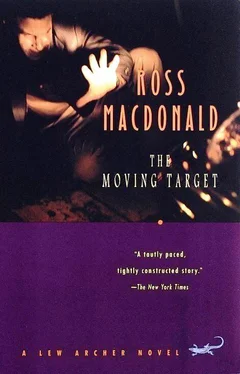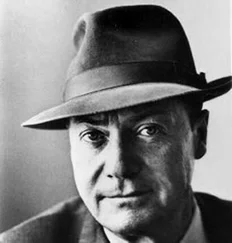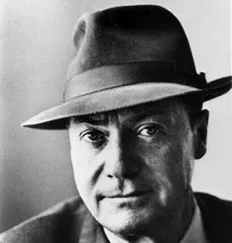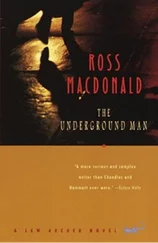“She will have, naturally, when her father dies, I wrote his will for him, and she gets half. I don’t object to the money–” he smiled wryly “–but I’m not a fortune-hunter, if that’s what you mean.”
“It isn’t. She might come into that money sooner than you think, though. The old man’s been running in some fast and funny circles in L. A. Did he ever mention a Mrs. Estabrook? Fay Estabrook? Or a man called Troy?”
“You know Troy? What sort of a character is he, anyway?”
“A gunman,” I said. “I’ve heard that he’s done murders.”
“I’m not surprised. I tried to tell Sampson to keep away from Troy, but Sampson thinks he’s fine.”
“Have you met Troy?”
“Sampson introduced me to him in Las Vegas a couple of months ago. The three of us went the rounds, and a lot of people seemed to know him. All the croupiers knew him, if that’s a recommendation.”
“It isn’t. But he had his own place in Las Vegas at one time. He’s done a lot of things. And I don’t think kidnapping would be beneath his dignity. How did Troy happen to be with Sampson?”
“I got the impression that he worked for Sampson, but I couldn’t be sure. He’s a queer fish. He watched me and Sampson gamble, but he wouldn’t himself. I dropped an even thousand that night. Sampson won four thousand. To him that hath shall be given.” He smiled ruefully.
“Maybe Troy was making a good impression,” I said.
“Maybe. The bastard gave me the creeps. Do you think he’s mixed up in this?”
“I’m trying to find out,” I said. “Does Sampson need money, Bert?”
“Hell, no! He’s a millionaire.”
“Why would he go into business with a jerk like Troy?”
“The time hangs heavy on his hands. The royalties roll in from Texas and Oklahoma, and he gets bored. Sampson’s a natural money-maker the way I’m a natural money-loser. He’s not happy unless he’s making it; I’m not happy unless I’m losing it.” He broke off short when Miranda entered the room.
“Ready?” she said. “Don’t worry about me, Bert.”
She pressed his shoulder with her hand. Her light-brown coat fell open in front, and her small sweatered breasts, pointed like weapons, were half impatient promise, half gradual threat. She had let down her hair and brushed it behind her ears. Her bright face slanted toward him like a challenge.
He kissed her cheek lightly and tenderly. I still felt sorry for him. He was a strong, intelligent man, but he looked a little stuffy beside her in his blue pin-stripe business suit. A little weary and old to tame a filly like Miranda.
The pass road climbed through sloping fields of dust-colored chaparral and raw red cutbacks. By holding the accelerator to the floor I kept our speed at fifty. The road narrowed and twisted more abruptly as we went up. I caught quick glimpses of boulder-strewn slopes, mile-wide canyons lined with mountain oak and spanned by telephone cables. Once through a gap in the hills I saw the sea like a low blue cloud slanting away behind. Then the road looped round into landlocked mountain wilderness, grayed and chilled suddenly by the clouds in the pass.
The clouds looked heavy and dense from the outside. When we entered them they seemed to thin out, blowing across the road in whitish filaments. Barren and dim through the clouds, the mountainside shouldered us. In a 1946 car, with a late-model girl beside me, I could still imagine we were crossing the watershed between Colton’s atomic age and the age of stone when men stood up on their hind legs and began to count time by the sun.
The fog grew denser, limiting my vision to twenty-five or thirty feet. I took the last hairpin curves in second. Then the road straightened out. At a definite point the laboring motor accelerated of its own accord, and we came out of the cloud. From the summit of the pass we could see the valley filled with sunlight like a bowl brimming with yellow butter, and the mountains clear and sharp on the other side.
“Isn’t it glorious?” Miranda said. “No matter how cloudy it is on the Santa Teresa side, it’s nearly always sunny in the valley. In the rainy season I often drive over by myself just to feel the sun.”
“I like the sun.”
“Do you really? I didn’t think you’d go in for simple things like sun. You’re the neon type, aren’t you?”
“If you say so.”
She was silent for a while, watching the leaping road, the blue sky streaming backward. The road cut straight and flat through the green-and-yellow checkerboard valley. With no one in sight but the Mexican braceros in the fields, I floor-boarded. The speedometer needle stuck halfway between eighty-five and ninety.
“What are you running away from, Archer?” she said, in a mocking tone.
“Not a thing. Do you want a serious answer?”
“It would be nice for a change.”
“I like a little danger. Tame danger, controlled by me. It gives me a sense of power, I guess, to take my life in my hands and know damn well I’m not going to lose it.”
“Unless we have a blowout.”
“I’ve never had one.”
“Tell me,” she said, “is that why you do your kind of work? Because you like danger?”
“It’s as good a reason as any. It wouldn’t be true, though.”
“Why, then?”
“I inherited the job from another man.”
“Your father?”
“Myself when I was younger. I used to think the world was divided into good people and bad people, that you could pin responsibility for evil on certain definite people and punish the guilty. I’m still going through the motions. And talking too much.”
“Don’t stop.”
“I’m fouled up. Why should I foul you up?”
“I am already. And I don’t understand what you said.”
“I’ll take it from the beginning. When I went into police work in 1935, I believed that evil was a quality some people were born with, like a harelip. A cop’s job was to find those people and put them away. But evil isn’t so simple. Everybody has it in him, and whether it comes out in his actions depends on a number of things. Environment, opportunity, economic pressure, a piece of bad luck, a wrong friend. The trouble is a cop has to go on judging people by rule of thumb, and acting on the judgment.”
“Do you judge people?”
“Everybody I meet. The graduates of the police schools make a big thing of scientific detection, and that has its place. But most of my work is watching people, and judging them.”
“And you find evil in everybody?”
“Just about. Either I’m getting sharper or people are getting worse. And that could be. War and inflation always raise a crop of stinkers, and a lot of them have settled in California.”
“You wouldn’t be talking about our family?” she said.
“Not especially.”
“Anyway, you can’t blame Ralph on the war – not entirely. He’s always been a bit of a stinker, at least since I’ve known him.”
“All your life?”
“All my life.”
“I didn’t know you felt that way about him.”
“I’ve tried to understand him,” she said. “Maybe he had his points when he was young. He started out with nothing, you know. His father was a tenant farmer who never had land of his own. I can understand why Ralph spent his life acquiring land. But you’d think he’d be more sympathetic to poor people, because he was poor himself. The strikers on the ranch, for instance. Their living conditions are awful and their wages aren’t decent, but Ralph won’t admit it. He’s been doing everything he can to starve them out and break the strike. He can’t seem to see that Mexican field-workers are people.”
“It’s a common enough illusion, and a useful one. It makes it easier to gouge people if you don’t admit they’re human – I’m developing into quite a moralist in early middle age.”
Читать дальше












